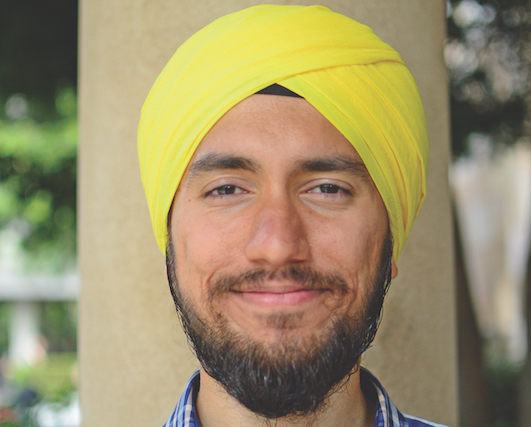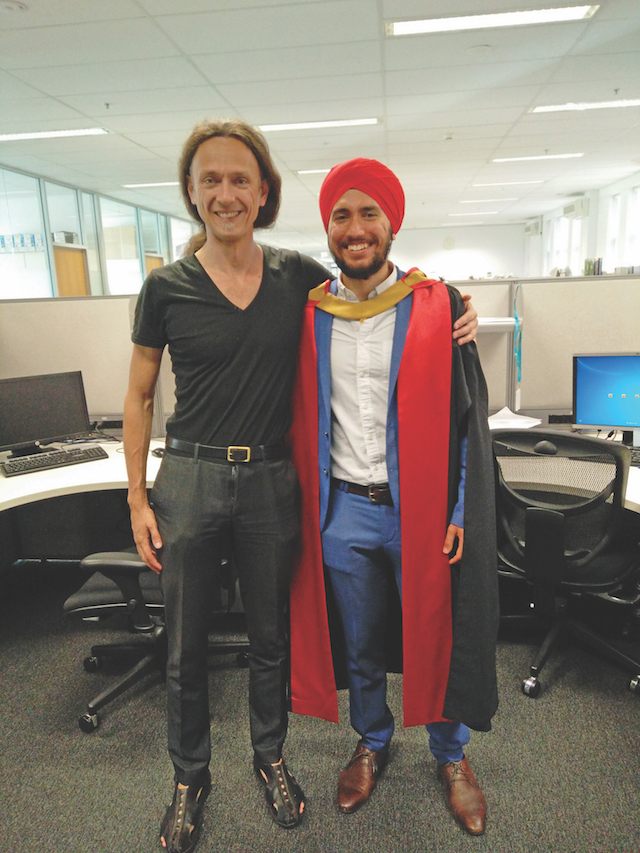Rachpon Kalra delves into the field of quantum computing and nanotechnology.
By Krishna Mawani
Rachpon Kalra, more fondly known as Rajvir, had his first taste of research in 2009 when he was studying electrical engineering for his undergraduate degree at the University of New South Wales (UNSW) in Sydney. That summer, he took up a research programme with globally-renowned Professor Andrea Morello, who was making a lot of breakthroughs in the field of quantum computing. Needless to say, Rajvir loved the experience, and so he gave up his initial pursuit for a corporate job, leaping into the world of quantum electronics by pursing a PhD.
Since then, he has spent nearly a decade in academia, receiving recognition and awards for his research in quantum science and nanotechnology. His future aspirations are not confirmed, as he may combine his background in science with his desire to try something out in business. One thing, however, is for certain; Rajvir will continue to make a positive contribution to humanity. It may be through his mechanical oscillator for a ‘quantum’ version of the Internet, or through a computer that is immune to radiation. Either way, this young scientist is bursting with immense potential.
Tell us a little about yourself.
I studied in Ruamrudee International School and enjoyed math and physics during IB. I decided to continue that in university, but I wanted to choose a field that would also open doors to a variety of jobs, so I chose electrical engineering. In fact, I chose it especially because I’d heard electrical engineers were in demand by banks for finance jobs. Obviously, things didn’t quite go the way I had initially envisioned. I started to really enjoy scientific engineering challenges. I finished my PhD early last year and I am still working as a scientist.
Were you ever unsure of your decision, as not many from the Thai-Indian community tread upon this path?
Yes, definitely. In fact, I still am! Fundamental research with this type of work is fraught with uncertainty. You don’t know whether or not the research you are doing is going to make an impact, so it can be hard to stick to it. That being said, I am optimistic that both quantum science and nanotechnology have a bright future and I feel lucky to be a part of it.
What influenced your choice to pursue this career path?
I think I just kept going with the flow and seizing opportunities that were in front of me. I started off with a vision of wanting to work in banking, but chose electrical engineering so I could continue to enjoy math and physics. Then I just happened to land up in Andrea’s quantum computing group, and before you know it, I became a quantum engineer.
Tell us about your job as Postdoctoral Research Fellow at the University of Queensland.
After my PhD, I wanted to work on something slightly different to expand my skill set. While my PhD taught me a lot about quantum electronics, I am now working with lasers and micro-mechanical oscillators (think tiny see-saws on a microchip). One of the projects I am working on is building a component for the future ‘quantum’ version of the internet. In today’s internet, information is transported across the globe as optical signals (light), but computers process information as electrical signals. A key component in the internet is the ‘transducer’ that converts the information between electrical and optical signals. However, the transducers in use today are not compatible with quantum information, which is why we have to design something new for the future ‘quantum internet’. Our design uses something that might seem quite out of place in an electronic device; we aim to use a tiny mechanical oscillator for the conversion. I am working on two other projects as well. One is to build a computer that is immune to radiation for use in space or in nuclear reactors, and the other is to build a magnetic field sensor which can be used for medical imaging.
What is a regular day for you in the lab?
I am either doing calculations, devising models in the office, fabricating devices in a clean room where I wear a suit that covers me from head to toe including an XL-size hood for my turban, or testing devices in a separate lab with measurement equipment. With experimental work, it is quite easy to judge progress – it is really just like any other project in any field. You set your goal, plan the necessary steps, and work towards each milestone one at a time, revising your plan as you go.
I understand you recently received an award for your work. How important is recognition for a scientist?
I received the Malcolm Chaikin award for my thesis from UNSW, where I did my PhD. Recognition is important, just as it is in many things in life. You are more likely to spend your money at a restaurant or for a movie with good reviews or awards. In the same way, funding agencies are more likely to grant funds to a researcher with a good track record.
What benefits and future predictions do you foresee for the field of quantum physics and nanotechnology?
You already use products that have been made possible by research into quantum physics and nanotechnology. Your phone has a billion transistors, each with features smaller than 20 nanometres; that in itself is a triumph of nanotechnology. GPS, something else we all use regularly, uses ultra-precise clocks that rely on quantum physics. I am sure the future will continue to bring positive developments.
Do you have time for a personal life? What are your hobbies outside your job?
I do not have as much free time as I would like, but I try to exercise regularly and do a bit of programming for projects on the side. I recently got married and finally having her here with me is fantastic. We try to make the most of our weekends and everything is just more fun together.
Do you miss Thailand? Do you see yourself coming back?
I miss home, family and friends very much. As for coming back, it all depends on what opportunities arise.







